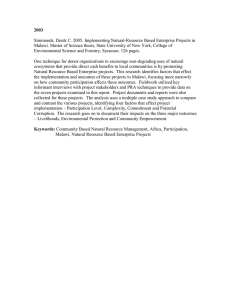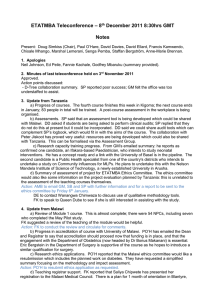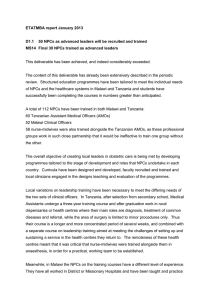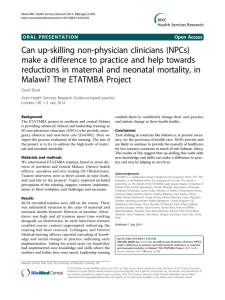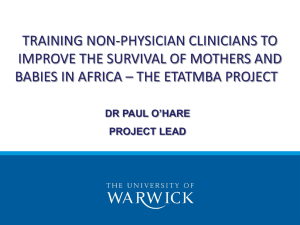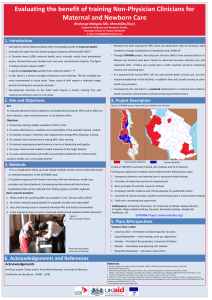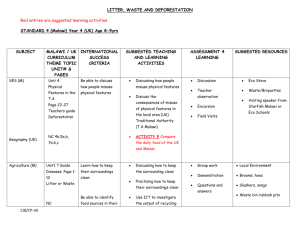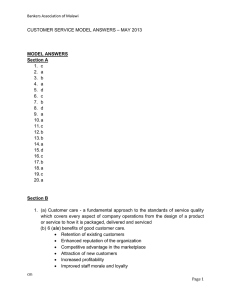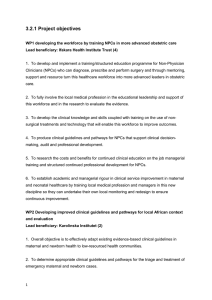ETATMBA report January 2013
advertisement
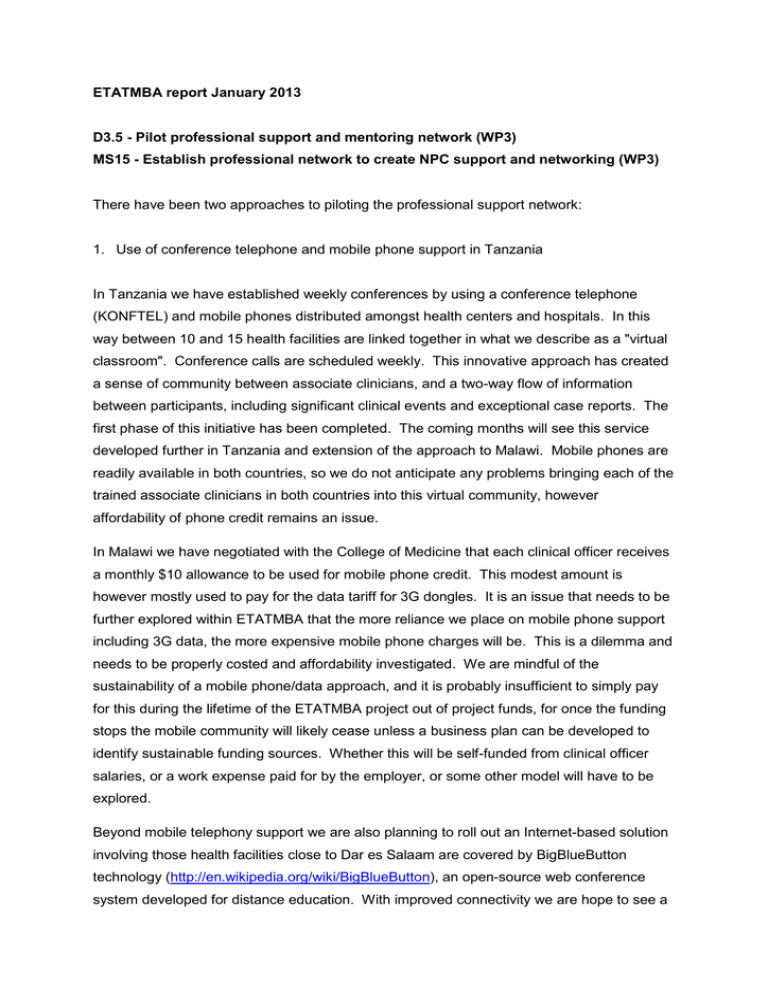
ETATMBA report January 2013 D3.5 - Pilot professional support and mentoring network (WP3) MS15 - Establish professional network to create NPC support and networking (WP3) There have been two approaches to piloting the professional support network: 1. Use of conference telephone and mobile phone support in Tanzania In Tanzania we have established weekly conferences by using a conference telephone (KONFTEL) and mobile phones distributed amongst health centers and hospitals. In this way between 10 and 15 health facilities are linked together in what we describe as a "virtual classroom". Conference calls are scheduled weekly. This innovative approach has created a sense of community between associate clinicians, and a two-way flow of information between participants, including significant clinical events and exceptional case reports. The first phase of this initiative has been completed. The coming months will see this service developed further in Tanzania and extension of the approach to Malawi. Mobile phones are readily available in both countries, so we do not anticipate any problems bringing each of the trained associate clinicians in both countries into this virtual community, however affordability of phone credit remains an issue. In Malawi we have negotiated with the College of Medicine that each clinical officer receives a monthly $10 allowance to be used for mobile phone credit. This modest amount is however mostly used to pay for the data tariff for 3G dongles. It is an issue that needs to be further explored within ETATMBA that the more reliance we place on mobile phone support including 3G data, the more expensive mobile phone charges will be. This is a dilemma and needs to be properly costed and affordability investigated. We are mindful of the sustainability of a mobile phone/data approach, and it is probably insufficient to simply pay for this during the lifetime of the ETATMBA project out of project funds, for once the funding stops the mobile community will likely cease unless a business plan can be developed to identify sustainable funding sources. Whether this will be self-funded from clinical officer salaries, or a work expense paid for by the employer, or some other model will have to be explored. Beyond mobile telephony support we are also planning to roll out an Internet-based solution involving those health facilities close to Dar es Salaam are covered by BigBlueButton technology (http://en.wikipedia.org/wiki/BigBlueButton), an open-source web conference system developed for distance education. With improved connectivity we are hope to see a breakthrough of real time lecturing over long distances and wider uptake of technology enhanced learning. This will likely be piloted in Tanzania first then trialed in Malawi and tested for scalability. However, as with the mobile telephony solution, to develop these ideas in a sustainable way would require funding on a scale that has not been conceived and further development grants working with new partners would need to be sought, with the complexity of the issues involved only becoming apparent with the pilot. 2. Web-based community of practice in Malawi In both Malawi and Tanzania, the project, in bringing together NPCs, has been a stimulus for them to begin to organise themselves into an organisation, become registered and develop more established structures for career advancement. The professional networks among the NPCs that have been established for those on the course in Malawi and Tanzania has formed a core for the development of National and Pan-African networks (eg the Africa Network for Associate Clinicians http://knowledge-gateway.org/associate_clinicians). Developing a professional association for NPCs involved in maternal and neonatal health that evolves from these networks and can be an agent of change to improve the quality, standards and performance of healthcare for mothers and babies in each country. To complement the pilot use of mobile telephony support in Tanzania, we have piloted a web-based Malawi NPC Network. This is a community bringing together non-physician clinicians committed to developing shared leadership, values and service improvement to improve maternal and neonatal health in Malawi. The Malawi NPC Network is a partner organisation to the Africa Network for Associate Clinicians, and shares the core values. These include the sharing of knowledge, expertise and innovations on NPC training and education in order to: gain political and professional support for NPCs, improve the quality and development of training in maternal and neonatal health, and contribute to a decrease in maternal and neonatal mortality. The network web site for Malawi can be found at: http://malawinpcnetwork.org/ The pilot web site is fully live and operations, and features a discussion board. We have tested the system and a small number of NPCs have already self-enrolled in this web-based community. Our next action is to enrol all 50 Malawian NPCs and to facilitate peer support through the use of the discussion forum, and the sharing of case reports and other significant clinical events. We also hope that this community will develop into a resource- sharing hub, as clinical officers discover and share valuable clinical learning resources appropriate for the Malawi setting. Administrative management of this Internet site has been shared with the College of Health Sciences in Malawi, one of the main organisations for basic training of clinical officers. Over the course of the coming months we hope that this group and the community of clinical officers themselves takes over the running and this site. Only in this way will the Malawi NPC Network become sustainable. Based on the success of the pilot Malawi NPC network, we have also created a sister site to support associate clinicians in Tanzania. This site has been called the Tanzania Associate Clinicians Network, after consultation with the local community of associate clinicians that have developed from the ETATMBA training in Ifakara. This site is also fully live but is still undergoing development, and has yet to establish a user base. This will be one of our priorities in the coming weeks. The live site can be found at http://tznac.org Manpower capacity issues Capacity issues in Malawi and Tanzania to support and sustain a communications system with a lack of trained obstetricians to provide manpower to sustain this service has been a major block to its development. We have tried to correct for this by providing professional support via email and phone from tutors to trainees on the courses when they return to the workplace. As NPCs are trained as specialists and through their professional association we will work to encourage senior staff to develop a communications system to support more junior colleagues needing advice in the workplace and will try to develop a system that can circumvent the capacity issue. The pilot professional networks of clinical officers has encouraged the provision of support from more senior clinical officers to their more junior peers and the cascading of teaching extended these processes to other healthcare staff.
